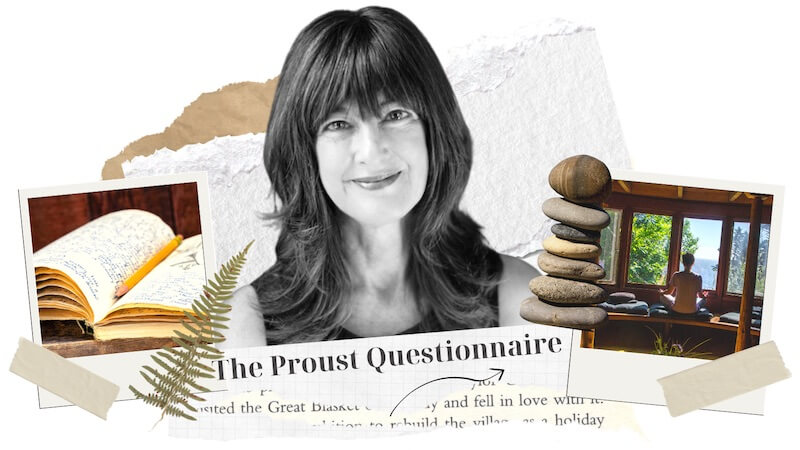
Inspired by 20th-century French writer Marcel Proust, we here at Esalen have created our own version of his favorite parlor game to dig just a little deeper — and differently — into our incredible faculty and staff.
Award-winning author (A Master Plan for Rescue, Mary; Mrs. A Lincoln, The Russian Word for Snow) and long-time Buddhist practitioner Janis Cooke Newman reveals the mutually reinforcing powers of writing and mindfulness. She tells us about building community, pearls of wisdom she's gained from fellow writers Sharon Salzburg and Ruth Ozeki, and even one perfect motto from His Holiness, the Dalai Lama.
What is Esalen to you?
To me, Esalen is about shared experience. The synergy that happens when we all gather in one place with the same intention. Every workshop I’ve taught at Esalen, I’ve been impressed by the openness of my seminarians — their willingness to try even the uncomfortable things, as well as the compassionate support they offer one other.
What do you do/are you doing at Esalen?
There were two practices that sustained me during the pandemic — my daily writing practice and my daily meditation practice. I’d long understood how they nourished each other. I became a better writer after I began a mindfulness practice. What I hadn’t realized was how each could be used to help me navigate trying times. My October workshop at Esalen is a deep dive into these two practices. Using guided meditations and mindfulness exercises, along with prompted free writing, I hope to give my participants the tools they need to cope even in the most difficult circumstances. (Becoming a better writer is a bonus!)
What is your idea of perfect happiness?
Being content with things exactly as they are. The Buddha says that one of the prime causes of suffering is wanting things to be different than they are. Sharon Salzburg says, “You can’t pick a fight with reality.”
What is your greatest fear in your work?
Being a writer is an emotional rollercoaster. One day, you think you’re brilliant, the next, you’re sure you have no idea what you’re doing. I always fear my writing isn’t good enough, or that no one will read me. I always try to remember something the writer (and Zen priest) Ruth Ozeki said, “The writer you are is enough.”
What do you consider the most overrated virtue?
I think the idea of busyness, of accomplishing as much as possible in as short a time as possible, has become a virtue in our culture. I know I often subscribe to this thinking. Chogyam Trungpa Rinpoche says that one of the primary human anxieties is a “fear of space.” Busyness is very good at filling that space. It keeps us from thinking about all the things we don’t want to think about (which doesn’t make them go away). This is one reason I think it’s important to step out of your life from time to time. It reminds us to stop. To do nothing but be.
What is the quality you most like in a human?
Curiosity. About other people. About the world. About themselves, their assumptions and behaviors. There is so much to be said for practicing a “Don’t know mind.”
What do you consider your greatest achievement?
I’ve long been interested in creating community for writers. What we do is so isolating, and not always understood by other people. Ten years ago, I founded Lit Camp (https://www.litcampwriters.org/), a nonprofit dedicated to helping writers find community. Just this past year, with the help of the SF Zen Center, I opened Page Street, a co-working space for writers in San Francisco.
How do you maintain your practice(s) during challenging times?
What sends me back to the meditation cushion time after time is the reminder that this isn’t an obligation, it’s something I do to take care of myself. What gets me back in front of my computer to write is the support of other writers, their encouragement, and the accountability they’re willing to extend to me.
How would you like to die?
With acceptance. In Buddhism, we talk a lot about impermanence, about the idea that death is a part of life. Yet I think it’s easy for the concept to remain an abstraction. I’ve recently started working as a hospice volunteer in an effort to make this inevitability more concrete.
What is your motto?
Always try to be kind to yourself, and to other people. His Holiness, the Dalai Lama says, “My religion is kindness.” Can’t really argue with that.
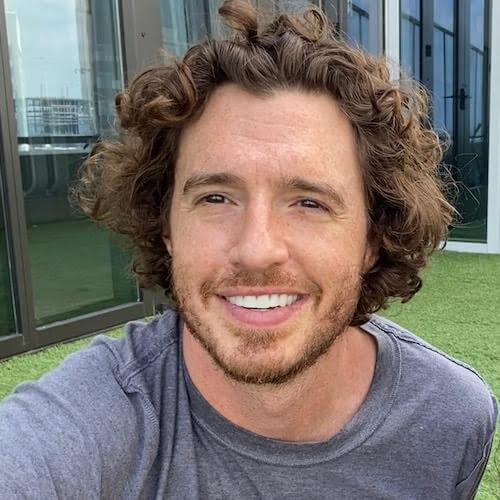
“Remembering to be as self compassionate as I can and praying to the divine that we're all a part of.”
–Aaron
“Prayer, reading, meditation, walking.”
–Karen
“Erratically — which is an ongoing stream of practice to find peace.”
–Charles
“Try on a daily basis to be kind to myself and to realize that making mistakes is a part of the human condition. Learning from our mistakes is a journey. But it starts with compassion and caring. First for oneself.”
–Steve
“Physically: aerobic exercise, volleyball, ice hockey, cycling, sailing. Emotionally: unfortunately I have to work to ‘not care’ about people or situations which may end painfully. Along the lines of ‘attachment is the source of suffering’, so best to avoid it or limit its scope. Sad though because it could also be the source of great joy. Is it worth the risk?“
–Rainer
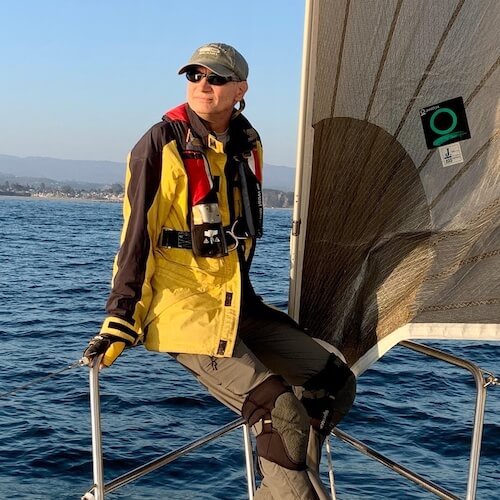

“It's time for my heart to be nurtured on one level yet contained on another. To go easy on me and to allow my feelings to be validated, not judged harshly. On the other hand, to let the heart rule with equanimity and not lead the mind and body around like a master.”
–Suzanne
“I spend time thinking of everything I am grateful for, and I try to develop my ability to express compassion for myself and others without reservation. I take time to do the things I need to do to keep myself healthy and happy. This includes taking experiential workshops, fostering relationships, and participating within groups which have a similar interest to become a more compassionate and fulfilled being.“
–Peter
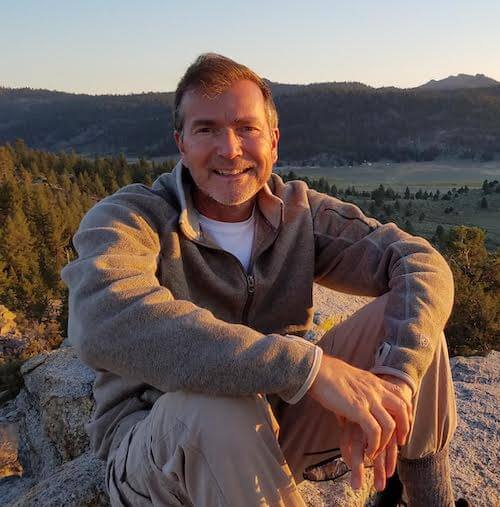
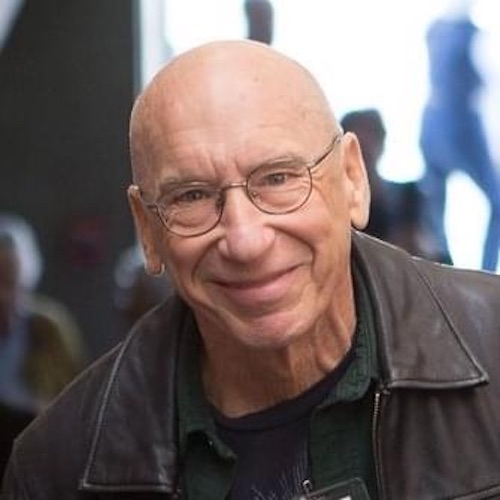
“Self-forgiveness for my own judgments. And oh yeah, coming to Esalen.”
–David B.
“Hmm, this is a tough one! I guess I take care of my heart through fostering relationships with people I feel connected to. Spending quality time with them (whether we're on the phone, through messages/letters, on Zoom, or in-person). Being there for them, listening to them, sharing what's going on with me, my struggles and my successes... like we do in the Esalen weekly Friends of Esalen Zoom sessions!”
–Lori

“I remind myself in many ways of the fact that " Love is all there is!" LOVE is the prize and this one precious life is the stage we get to learn our lessons. I get out into nature, hike, camp, river kayak, fly fish, garden, I create, I dance (not enough!), and I remain grateful for each day, each breath, each moment. Being in the moment, awake, and remembering the gift of life and my feeling of gratitude for all of creation.”
–Steven
“My physical heart by limiting stress and eating a heart-healthy diet. My emotional heart by staying in love with the world and by knowing that all disappointment and loss will pass.“
–David Z.
Today, September 29, is World Heart Day. Strike up a conversation with your own heart and as you feel comfortable, encourage others to do the same. As part of our own transformations and self-care, we sometimes ask for others to illuminate and enliven our hearts or speak our love language.
What if we could do this for ourselves too, even if just for today… or to start a heart practice, forever?
Janis leads Writing & Mindfulness: Cultivating a Practice for Navigating Difficult Times, October 17–21, 2022.

Inspired by 20th-century French writer Marcel Proust, we here at Esalen have created our own version of his favorite parlor game to dig just a little deeper — and differently — into our incredible faculty and staff.
Award-winning author (A Master Plan for Rescue, Mary; Mrs. A Lincoln, The Russian Word for Snow) and long-time Buddhist practitioner Janis Cooke Newman reveals the mutually reinforcing powers of writing and mindfulness. She tells us about building community, pearls of wisdom she's gained from fellow writers Sharon Salzburg and Ruth Ozeki, and even one perfect motto from His Holiness, the Dalai Lama.
What is Esalen to you?
To me, Esalen is about shared experience. The synergy that happens when we all gather in one place with the same intention. Every workshop I’ve taught at Esalen, I’ve been impressed by the openness of my seminarians — their willingness to try even the uncomfortable things, as well as the compassionate support they offer one other.
What do you do/are you doing at Esalen?
There were two practices that sustained me during the pandemic — my daily writing practice and my daily meditation practice. I’d long understood how they nourished each other. I became a better writer after I began a mindfulness practice. What I hadn’t realized was how each could be used to help me navigate trying times. My October workshop at Esalen is a deep dive into these two practices. Using guided meditations and mindfulness exercises, along with prompted free writing, I hope to give my participants the tools they need to cope even in the most difficult circumstances. (Becoming a better writer is a bonus!)
What is your idea of perfect happiness?
Being content with things exactly as they are. The Buddha says that one of the prime causes of suffering is wanting things to be different than they are. Sharon Salzburg says, “You can’t pick a fight with reality.”
What is your greatest fear in your work?
Being a writer is an emotional rollercoaster. One day, you think you’re brilliant, the next, you’re sure you have no idea what you’re doing. I always fear my writing isn’t good enough, or that no one will read me. I always try to remember something the writer (and Zen priest) Ruth Ozeki said, “The writer you are is enough.”
What do you consider the most overrated virtue?
I think the idea of busyness, of accomplishing as much as possible in as short a time as possible, has become a virtue in our culture. I know I often subscribe to this thinking. Chogyam Trungpa Rinpoche says that one of the primary human anxieties is a “fear of space.” Busyness is very good at filling that space. It keeps us from thinking about all the things we don’t want to think about (which doesn’t make them go away). This is one reason I think it’s important to step out of your life from time to time. It reminds us to stop. To do nothing but be.
What is the quality you most like in a human?
Curiosity. About other people. About the world. About themselves, their assumptions and behaviors. There is so much to be said for practicing a “Don’t know mind.”
What do you consider your greatest achievement?
I’ve long been interested in creating community for writers. What we do is so isolating, and not always understood by other people. Ten years ago, I founded Lit Camp (https://www.litcampwriters.org/), a nonprofit dedicated to helping writers find community. Just this past year, with the help of the SF Zen Center, I opened Page Street, a co-working space for writers in San Francisco.
How do you maintain your practice(s) during challenging times?
What sends me back to the meditation cushion time after time is the reminder that this isn’t an obligation, it’s something I do to take care of myself. What gets me back in front of my computer to write is the support of other writers, their encouragement, and the accountability they’re willing to extend to me.
How would you like to die?
With acceptance. In Buddhism, we talk a lot about impermanence, about the idea that death is a part of life. Yet I think it’s easy for the concept to remain an abstraction. I’ve recently started working as a hospice volunteer in an effort to make this inevitability more concrete.
What is your motto?
Always try to be kind to yourself, and to other people. His Holiness, the Dalai Lama says, “My religion is kindness.” Can’t really argue with that.

“Remembering to be as self compassionate as I can and praying to the divine that we're all a part of.”
–Aaron
“Prayer, reading, meditation, walking.”
–Karen
“Erratically — which is an ongoing stream of practice to find peace.”
–Charles
“Try on a daily basis to be kind to myself and to realize that making mistakes is a part of the human condition. Learning from our mistakes is a journey. But it starts with compassion and caring. First for oneself.”
–Steve
“Physically: aerobic exercise, volleyball, ice hockey, cycling, sailing. Emotionally: unfortunately I have to work to ‘not care’ about people or situations which may end painfully. Along the lines of ‘attachment is the source of suffering’, so best to avoid it or limit its scope. Sad though because it could also be the source of great joy. Is it worth the risk?“
–Rainer


“It's time for my heart to be nurtured on one level yet contained on another. To go easy on me and to allow my feelings to be validated, not judged harshly. On the other hand, to let the heart rule with equanimity and not lead the mind and body around like a master.”
–Suzanne
“I spend time thinking of everything I am grateful for, and I try to develop my ability to express compassion for myself and others without reservation. I take time to do the things I need to do to keep myself healthy and happy. This includes taking experiential workshops, fostering relationships, and participating within groups which have a similar interest to become a more compassionate and fulfilled being.“
–Peter


“Self-forgiveness for my own judgments. And oh yeah, coming to Esalen.”
–David B.
“Hmm, this is a tough one! I guess I take care of my heart through fostering relationships with people I feel connected to. Spending quality time with them (whether we're on the phone, through messages/letters, on Zoom, or in-person). Being there for them, listening to them, sharing what's going on with me, my struggles and my successes... like we do in the Esalen weekly Friends of Esalen Zoom sessions!”
–Lori

“I remind myself in many ways of the fact that " Love is all there is!" LOVE is the prize and this one precious life is the stage we get to learn our lessons. I get out into nature, hike, camp, river kayak, fly fish, garden, I create, I dance (not enough!), and I remain grateful for each day, each breath, each moment. Being in the moment, awake, and remembering the gift of life and my feeling of gratitude for all of creation.”
–Steven
“My physical heart by limiting stress and eating a heart-healthy diet. My emotional heart by staying in love with the world and by knowing that all disappointment and loss will pass.“
–David Z.
Today, September 29, is World Heart Day. Strike up a conversation with your own heart and as you feel comfortable, encourage others to do the same. As part of our own transformations and self-care, we sometimes ask for others to illuminate and enliven our hearts or speak our love language.
What if we could do this for ourselves too, even if just for today… or to start a heart practice, forever?
Janis leads Writing & Mindfulness: Cultivating a Practice for Navigating Difficult Times, October 17–21, 2022.

Inspired by 20th-century French writer Marcel Proust, we here at Esalen have created our own version of his favorite parlor game to dig just a little deeper — and differently — into our incredible faculty and staff.
Award-winning author (A Master Plan for Rescue, Mary; Mrs. A Lincoln, The Russian Word for Snow) and long-time Buddhist practitioner Janis Cooke Newman reveals the mutually reinforcing powers of writing and mindfulness. She tells us about building community, pearls of wisdom she's gained from fellow writers Sharon Salzburg and Ruth Ozeki, and even one perfect motto from His Holiness, the Dalai Lama.
What is Esalen to you?
To me, Esalen is about shared experience. The synergy that happens when we all gather in one place with the same intention. Every workshop I’ve taught at Esalen, I’ve been impressed by the openness of my seminarians — their willingness to try even the uncomfortable things, as well as the compassionate support they offer one other.
What do you do/are you doing at Esalen?
There were two practices that sustained me during the pandemic — my daily writing practice and my daily meditation practice. I’d long understood how they nourished each other. I became a better writer after I began a mindfulness practice. What I hadn’t realized was how each could be used to help me navigate trying times. My October workshop at Esalen is a deep dive into these two practices. Using guided meditations and mindfulness exercises, along with prompted free writing, I hope to give my participants the tools they need to cope even in the most difficult circumstances. (Becoming a better writer is a bonus!)
What is your idea of perfect happiness?
Being content with things exactly as they are. The Buddha says that one of the prime causes of suffering is wanting things to be different than they are. Sharon Salzburg says, “You can’t pick a fight with reality.”
What is your greatest fear in your work?
Being a writer is an emotional rollercoaster. One day, you think you’re brilliant, the next, you’re sure you have no idea what you’re doing. I always fear my writing isn’t good enough, or that no one will read me. I always try to remember something the writer (and Zen priest) Ruth Ozeki said, “The writer you are is enough.”
What do you consider the most overrated virtue?
I think the idea of busyness, of accomplishing as much as possible in as short a time as possible, has become a virtue in our culture. I know I often subscribe to this thinking. Chogyam Trungpa Rinpoche says that one of the primary human anxieties is a “fear of space.” Busyness is very good at filling that space. It keeps us from thinking about all the things we don’t want to think about (which doesn’t make them go away). This is one reason I think it’s important to step out of your life from time to time. It reminds us to stop. To do nothing but be.
What is the quality you most like in a human?
Curiosity. About other people. About the world. About themselves, their assumptions and behaviors. There is so much to be said for practicing a “Don’t know mind.”
What do you consider your greatest achievement?
I’ve long been interested in creating community for writers. What we do is so isolating, and not always understood by other people. Ten years ago, I founded Lit Camp (https://www.litcampwriters.org/), a nonprofit dedicated to helping writers find community. Just this past year, with the help of the SF Zen Center, I opened Page Street, a co-working space for writers in San Francisco.
How do you maintain your practice(s) during challenging times?
What sends me back to the meditation cushion time after time is the reminder that this isn’t an obligation, it’s something I do to take care of myself. What gets me back in front of my computer to write is the support of other writers, their encouragement, and the accountability they’re willing to extend to me.
How would you like to die?
With acceptance. In Buddhism, we talk a lot about impermanence, about the idea that death is a part of life. Yet I think it’s easy for the concept to remain an abstraction. I’ve recently started working as a hospice volunteer in an effort to make this inevitability more concrete.
What is your motto?
Always try to be kind to yourself, and to other people. His Holiness, the Dalai Lama says, “My religion is kindness.” Can’t really argue with that.

“Remembering to be as self compassionate as I can and praying to the divine that we're all a part of.”
–Aaron
“Prayer, reading, meditation, walking.”
–Karen
“Erratically — which is an ongoing stream of practice to find peace.”
–Charles
“Try on a daily basis to be kind to myself and to realize that making mistakes is a part of the human condition. Learning from our mistakes is a journey. But it starts with compassion and caring. First for oneself.”
–Steve
“Physically: aerobic exercise, volleyball, ice hockey, cycling, sailing. Emotionally: unfortunately I have to work to ‘not care’ about people or situations which may end painfully. Along the lines of ‘attachment is the source of suffering’, so best to avoid it or limit its scope. Sad though because it could also be the source of great joy. Is it worth the risk?“
–Rainer


“It's time for my heart to be nurtured on one level yet contained on another. To go easy on me and to allow my feelings to be validated, not judged harshly. On the other hand, to let the heart rule with equanimity and not lead the mind and body around like a master.”
–Suzanne
“I spend time thinking of everything I am grateful for, and I try to develop my ability to express compassion for myself and others without reservation. I take time to do the things I need to do to keep myself healthy and happy. This includes taking experiential workshops, fostering relationships, and participating within groups which have a similar interest to become a more compassionate and fulfilled being.“
–Peter


“Self-forgiveness for my own judgments. And oh yeah, coming to Esalen.”
–David B.
“Hmm, this is a tough one! I guess I take care of my heart through fostering relationships with people I feel connected to. Spending quality time with them (whether we're on the phone, through messages/letters, on Zoom, or in-person). Being there for them, listening to them, sharing what's going on with me, my struggles and my successes... like we do in the Esalen weekly Friends of Esalen Zoom sessions!”
–Lori

“I remind myself in many ways of the fact that " Love is all there is!" LOVE is the prize and this one precious life is the stage we get to learn our lessons. I get out into nature, hike, camp, river kayak, fly fish, garden, I create, I dance (not enough!), and I remain grateful for each day, each breath, each moment. Being in the moment, awake, and remembering the gift of life and my feeling of gratitude for all of creation.”
–Steven
“My physical heart by limiting stress and eating a heart-healthy diet. My emotional heart by staying in love with the world and by knowing that all disappointment and loss will pass.“
–David Z.
Today, September 29, is World Heart Day. Strike up a conversation with your own heart and as you feel comfortable, encourage others to do the same. As part of our own transformations and self-care, we sometimes ask for others to illuminate and enliven our hearts or speak our love language.
What if we could do this for ourselves too, even if just for today… or to start a heart practice, forever?
Janis leads Writing & Mindfulness: Cultivating a Practice for Navigating Difficult Times, October 17–21, 2022.